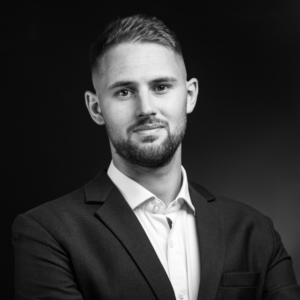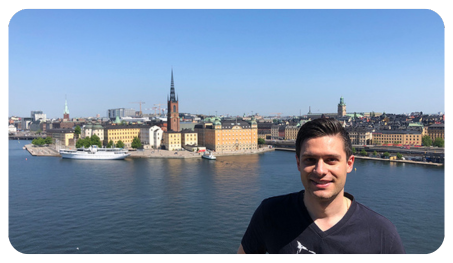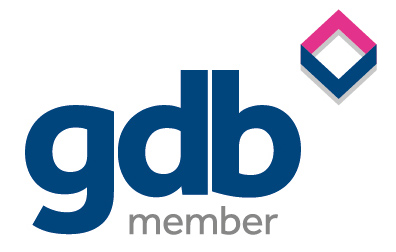Harvey John
Unit 2 Ferry Wharf
Hove Enterprise Centre
Basin Road North
Portslade, East Sussex
BN41 1BD
Here within the Tax team at Harvey John, it’d be pretty fair to say we have a natural bias for all things tax! However, in this case, Fabio highlights how specialising isn’t always the career move for everyone, but also acknowledging that having a specialised role doesn’t pigeonhole you from a wider finance focus.
We’ve had a professional horse rider, and cricketer, and now we’re joined by an ex-professional footballer! Checking off Italy, Latvia, England, and Sweden, Fabio delves deep into how cultures should be embraced, making the most of such an expansive network that we’re lucky enough to be a part of. There’s a common pattern within this interview series, and we have yet another well-constructed argument about embracing these sorts of opportunities when they arise.
Fabio, welcome! You’ve lived in some truly interesting areas of the world, so I’m excited and grateful that you’ve agreed to participate in this week’s edition of the ‘Tax Expat’. To settle us in Fabio, can you please give us an introduction to yourself?
Thank you, Ed! Sure, I was born 31 years ago in a small town near Treviso, Italy. I’m also a Canadian citizen as my dad was born in Canada. I was raised in Italy for about 24 years where I started my professional career in a small company, but for my life at that time, my focus was on one of my biggest passions: football. I’ve been playing football since I was 6 years old and I got the chance to play it professionally when I moved to England, before moving back to Italy and playing in the 3rd division.
After a short time, I ended up in Lithuania and then Latvia in their 1st division. It was in Latvia when I decided that it was the right time to have a more stable career and I went back to more ‘normal’ work. I also recently finished my bachelor’s degree in accounting at Oxford Brookes University.
I can see that you previously worked in Treviso, Italy (home of Prosecco if I’m not mistaken), but is this where working life began for you?
Yes exactly, it’s the home of Prosecco, even though I don’t like wine at all!
It was in Treviso that I started to work in administration for a small chair manufacturing company. There I got valuable experience both from a business and from an administrative point of view in managing a company. This helped me quite a lot in today’s more multinational position, from understanding the processes and dynamics. Firstly, in a microenvironment, then applying what I learned to a much bigger multinational environment.
I started from the very basics, as my High School Diploma is related to IT. I was doing basic data entry and it was more focused on looking at IT systems.
Luckily, during my time there, the company was growing rapidly and also, thanks to my IT skills, my managers involved me in more economic/accounting tasks. Because of this, I immediately understood that the economic/financial field was much more interesting. I got to know each process of the company from sales to pricing, procurement, finance and accounting.
I’ve not spoken to many finance/tax professionals who have relocated to Latvia, and call me naïve, but I don’t know too much about the country! What prompted such a move?
Latvia is a small country facing the Baltic Sea right in front of Sweden. It’s quite a young country since it obtained its independence from the Soviet Union only 28 years ago and, in my opinion, it’s still possible to feel the influence of this historical period in the country and the people.
I ended up in Latvia during my professional football career, but after 1 year, I realized it was the right time to get back to my working career. Thanks to Circle K, I was able to challenge myself in a position within a much bigger multinational environment than I used to work in previously.
The company was also looking for someone with more language knowledge than only English, as the position involved communication with all European countries. So, my Italian language skills and previous professional experience helped me in securing the position.
Spending 4 years in Latvia with Circle K, I can see that this is where you experienced a role that was solely focused on indirect tax. How did you find working in such a specialist role?
The experience I had in Italy helped a lot in terms of understanding the ‘tax world’, even from the perspective of a small company.
The position with Circle K was very challenging as it was a very international role in which I had to deal with Indirect taxes in all EU and some non-EU countries. It was really interesting and I got to know many details about EU Directives and how different countries are adopting these guidelines.
I think working in a big multinational company, in such a specialised area, made a big impact on my career. What I enjoyed the most was the fact that, with the experience I was getting from solving daily tasks and tax-related issues, colleagues were increasingly looking at me as an expert in the field.
Which aspect helped you the most to succeed at Circle K, firstly in the Indirect Tax role and later in more senior financial controlling roles?
I think one of the main aspects that helped me succeed at Circle K very quickly was that I found myself more ready than many professionals to work independently and take ownership of the tasks I was doing. I was improving, thanks to the fact that I put in my contributions, which is more than what’s expected. Especially in the Latvian environment, everything was much more standardized with very low deviations and personal contributions.
This is something, I believe, that’s the biggest takeaway from the previous experience I had in Italy. There was less specified division of duties and more space for proactivity in that different and smaller environment.
I’ve been able to look at new tasks as an opportunity rather than as unexpected extra work and, thanks to this, I think I’ve learnt a lot about the fuel and retail business and corporate environments in general.
I’m also very precise (sometimes my friends say too much!), so when I start something, I need to finish it at a perfect level otherwise I don’t feel I’ve achieved what I wanted. I think this is also a fact that enabled my colleagues, managers, and peers, in general, to know that they could count on my work.
Your very recent change has been with Pirelli in Stockholm. What stands out to me is that you’re not afraid of making big life-changing moves, but do you ever miss aspects of life in Italy?
I moved very recently (in May) to Stockholm and I started to work as a Financial Controller for Pirelli.
Since I was a child, I have always ‘dreamed’ of living abroad – to me, it’s more appealing than living in my home country and this, in part, helps me not feel the distance from home.
Of course, coming from Italy and having a nice and big family, I miss the food of my mum and grandma and sometimes I miss just having more comfortable ‘daily living’ at home in Italy. For example, when coming back from work in the late evening the pantry at my apartment is totally empty!
But this partly compensated for the fact that I’m living in the centre of Stockholm and there are many more opportunities than in the small town where I lived in Italy (home food deliveries saved my day in many cases!).
You’ve been in Stockholm for only a few months now, so perhaps not enough time to accurately portray what life is like. However, first impressions are always important! How has your time there been to date?
I love Stockholm! Actually, the position at Circle K in Latvia often required business trips to Stockholm as it was focused on the Circle K Swedish Business Unit. This is why I was already familiar with the city and why I decided to start looking at the possibility of moving here.
I love order and everything is so well organized and easy in every aspect of daily life here. I live in the city centre and I have everything I need, everything I could look for (and a lot extra!) right outside the door of my apartment.
People here in Sweden are very calm (like me), so it’s been quite easy to decide that it was the right move for me at this point, maybe also looking long term.
Language, at the moment, isn’t an issue as everyone speaks English very well but, for sure one of the next steps is to learn Swedish.
Working with Pirelli as a Financial Controller must be exciting. Being a fan of motorsports myself, I can see why working for such an iconic brand would be so appealing. Have you found it hard adjusting to working with Pirelli compared to the retail sector you previously worked in?
I’m a big fan of motorsport too, actually much earlier than following my passion for football. Motorsport, especially Formula One, was the first sport that caught my attention and my passion.
Of course, working for Pirelli was very appealing when I decided it was the right offer to accept as the business is quite different compared to retail. But, I think that two factors helped me understand the new environment much quicker. The first one was the experience gained previously and the second, all the new colleagues – we have a very multicultural office which, I think, is an added value.
How would you rate your relocation experience overall? If you could turn back time, would you have made the same move?
Well, it won’t sound original, but I think I’d do the same move.
I don’t have regrets, nor do I think that there are some things I could have done differently. It was a big life-changing decision when I took the opportunity to move to England but I enjoyed every single moment following a big passion like football.
If I look back, I can easily say that football helped me gain confidence in myself a lot. Also, it’s a much better ‘gym of life’ than many people might think and, together with the education received from my family, I think is a great mix which influenced me a lot throughout my life.
Without football, I wouldn’t have had the opportunity to end up in Latvia, where I worked for Circle K and where, at the same time, I worked towards the last steps of my bachelor’s in accounting and the ACCA membership. It was this path that gave me the corporate experience needed to move to Pirelli in Stockholm.
Being a sports lover myself, I love the fact that it’s been a platform which has given you plenty of opportunities. Based on your experiences, what advice can you share for other tax professionals who are considering a relocation abroad for their career?
I’d say for sure to not hesitate one moment to take the chance. It’ll be a challenge, but overcoming this challenge is one of the best feelings to experience, also because everyone will look at you like you’ve done something important as you’ve succeeded away from home.
Of course, it won’t be an easy and quick process, there are many ‘no’s to accept but those ‘no’s will make you grow and adapt in order to make the right decisions in the future.
More practical advice is to move a little bit earlier than the first working day so you can familiarize yourself with the new city, find the best areas to live, and understand the new environment and culture.
For sure there will be moments when you think that everything is going wrong, but the best thing is to have an objective and a plan for reaching that objective (and sometimes being flexible and adapting the plan). By only having what you want to achieve and who you want to become in mind, you’ll eventually find a way to get there, without forgetting what makes you happy.
Perfect Fabio. I truly appreciate you taking the time to offer a great insight into what seizing opportunity looks like. Don’t be a stranger!
—
Are you a Tax Expat? If so, we’d love to hear about your experiences and share them with our global tax network. For more information, please contact Alex Mann.
If you would like to see our company updates and industry insights, follow our LinkedIn page here.
Author

From boutiques to the Big 4, and start-ups to multinational corporations, Alex manages a diverse portfolio of clients worldwide which has enabled him to develop a vast global network of indirect tax and tax technology professionals in 40+ countries.








